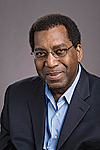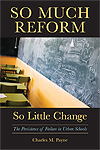Reforms require establishing a set of standards for implementation
By William Harmsw-harms@uchicago.edu
News Office
 Charles Payne | |
Chicago is an ideal place to study one of the most vexing questions of school reform: Why has so much hope and effort led to disappointment?
Beginning in the late 1980s, the Chicago Public Schools launched a series of initiatives to reorganize schools, improve teaching and encourage parental participation.
The changes in Chicago not always have met the expectations of proponents, wrote Charles Payne in his new book, So Much Reform, So Little Change: The Persistence of Failure in Urban Schools. The results of school reform efforts nationally also have led to some disappointment.
A lack of trust among teachers and principals and parents frequently creates dysfunction in schools, noted Payne. The organizational infrastructure frequently frustrates well-intended reforms, and supports for high-quality instruction and teacher-student relationships are too often absent.
Tension among members of the business community, who promote sound management and accountability, and progressive educators, who favor a student-centered agenda, also has left some of the promise of reform unfulfilled.
 So Much Reform, So Little Change | |
Payne, the Frank P. Hixon Professor in the School of Social Service Administration and a leading scholar of school reform, noted that other cities have gone through similar bouts of reform, but few had Chicago’s advantages. Other cities lack the scrutiny that has come from the Consortium on Chicago School Research and the valuable news coverage of education by the local media, he said.
“The Consortium on Chicago School Research is the closest thing we have to a Manhattan Project on urban schools, and from its inception, it has maintained a commitment to combining quantitative and qualitative work, affording its work a complexity that cannot be achieved when the two are separated,” Payne said.
Additionally, CPS administrators take the recommendations of the Consortium seriously, and this has led to a relationship between the schools and the research community that is rare among the nation’s largest school systems. Those recommendations have led to positive changes, including a promising new emphasis on reducing dropouts and increasing college-going rates.
Payne, who is a member of the Committee on Education, uses findings from the consortium, his research and reporting by the city’s media to explore the problems that continue to plague this school system and others. “Chicago enjoys an unprecedented quality of educational journalism,” he said. Catalyst: Voices of Chicago School Reform, has put a spotlight on the schools, as have the Chicago Tribune and other local media outlets.
In his visits to schools, Payne learned that social relationships were key to student success. “Students wanted to perform well because of their teachers,” he said. Likewise, he observed that the Consortium had found trust among teachers also was an important factor in improving schools. In schools where trust among adults improved over time, student achievement also improved.
Implementing new curriculums often is seen as a way to boost achievement, but that implementation often is poorly supported. Among Payne’s recommendations is one that educators are discussing nationally—establishing standards for implementation that recognize the time and money needed to initiate meaningful reforms and a way to gather data that helps educators learn from the implementation.
Implementing a new mathematics curriculum, for instance, which moves from memorization to an inquiry-based approach, could require five full days of pre-implementation professional development, continued professional development and active involvement from the principal. Without that level of commitment, reforms are likely to be ineffective, he said.
The increased visibility from the research community and the media has been part of a citywide interest in education that includes business leaders. The ensuing political tensions have led to misunderstandings that have slowed the pathway of reform.
Payne suggests that both sides begin to listen to each other. Advocates of the liberal perspective can learn from those who talk about sound management practices in schools, while advocates of a conservative perspective also could learn from the other side, said Payne.
![[Chronicle]](/images/sidebar_header_oct06.gif)